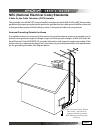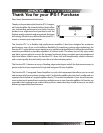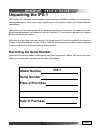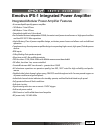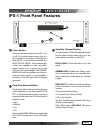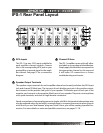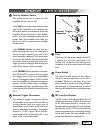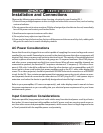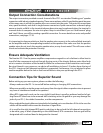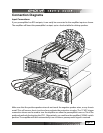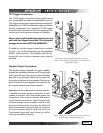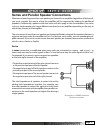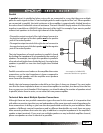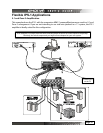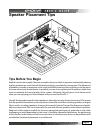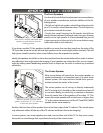
Page 14
Page 15
Output Connection Considerations
The output connectors provided on each channel of the IPS-1 are standard “binding post” speaker
connectors with industry standard spacing. These are sometimes called 5-way binding posts because
of the many ways in which the speaker wire can connect into the posts. The posts can accept bare
wire, spade terminals, and dual or single banana connectors. Spade connections or banana plugs
ensure a simple, solid t in the terminal whereas bare wire may be awkward when the terminal is
screwed down to compress the wire into place. Keep in mind that if you use “dual banana” plugs
and “stack” them, you will be creating a parallel connection. For more details on series and parallel
connections, see pages 17-18.
It is important to observe polarity so that the speaker wire connects to the red and black terminals
on the amplier and the corresponding terminals at the speaker. Also make sure that the positive
speaker wires do not touch the negative speaker wires, or any chassis metal. This will cause a short
circuit and activate the protection circuitry.
Ensure Adequate Ventilation
The Emotiva IPS-1 has the power amplier components arragned in such a fashion to allow heat to
rise o of the components and out through the top vents of the chassis. Bottom vents allow fresh
air in to create a circulation of the heated air. While the surface area of the heatsink on each ampli-
er circuit board is very generous, we advise all installations to leave 2-3 inches above the top of
the IPS-1 chassis so that adequate ventilation is supported. Furthermore, it is not advised to place
another amplier below the unit as that heat will have to also pass up through the IPS-1.
Connection Tips for Superior Sound
Before setting up your new system, please consider the following:
• Always make sure the IPS-1 is turned o before making or changing ANY connections.
• Whenever possible, route the power cords away from the signal cables or speaker wires to prevent
any hum or interference heard in the speakers.
• Many RCA type patch cords can be a very tight t and there is usually a preferred method of get-
ting them o. Some have to be removed with a twisting action. Be gentle or you may damage the
jacks of your IPS-1, the cables themselves, or other components.
• Many audiophile signal cables are intended to be hooked up in one direction. If this is the case the
cables will be marked with arrows the direction of signal ow.
• It is usual for the right channel RCA patch cord plugs to be red and the left channel connections
to be white, grey, or black (depending on the cable brand). RCA connectors that are gold will be
designated with a colored band to designate the channel.



